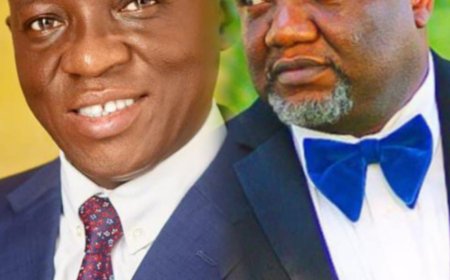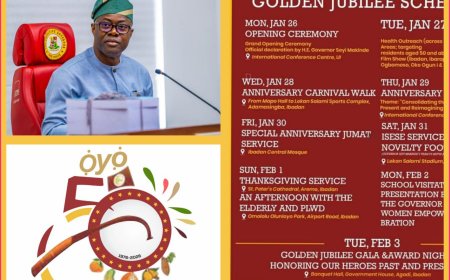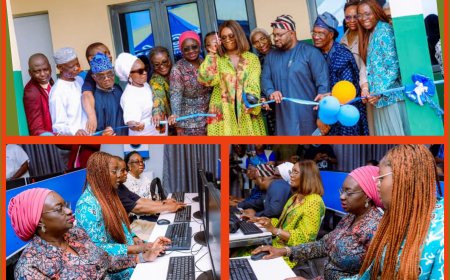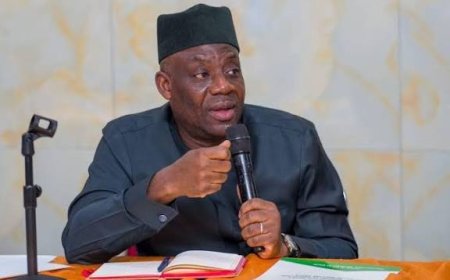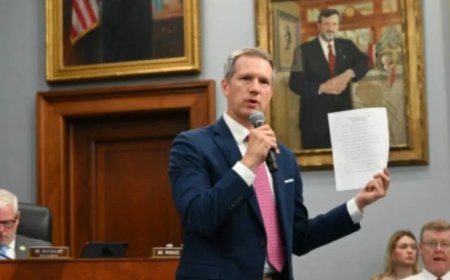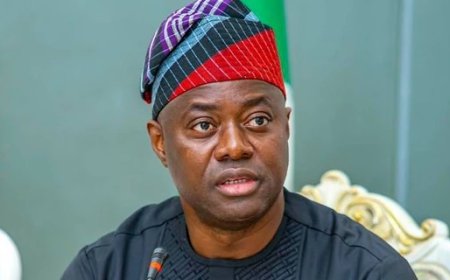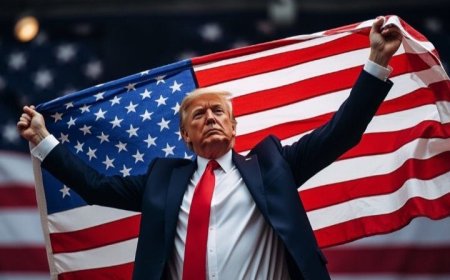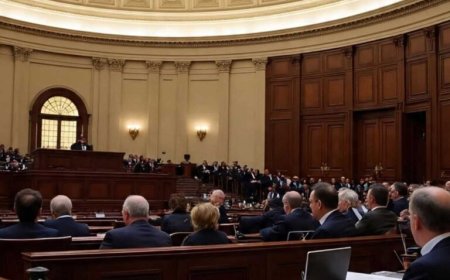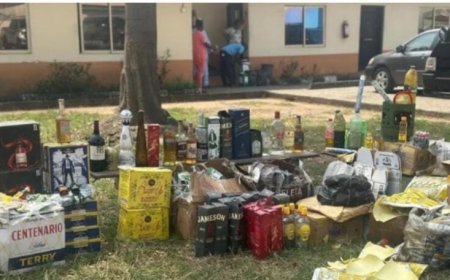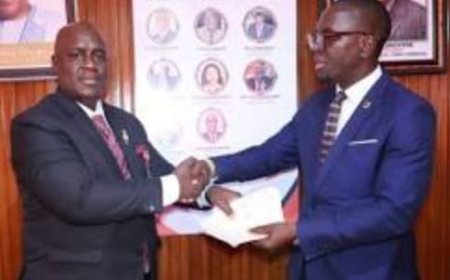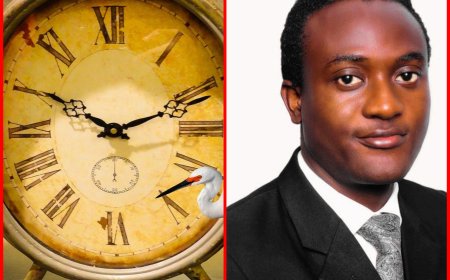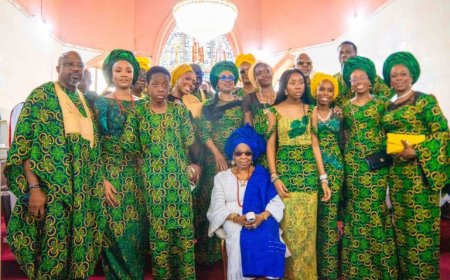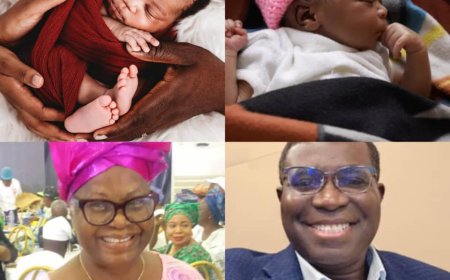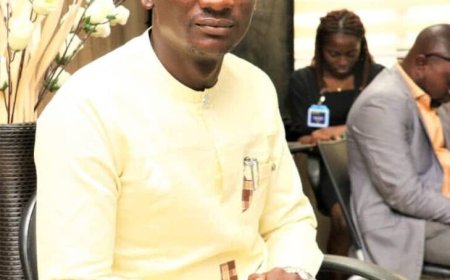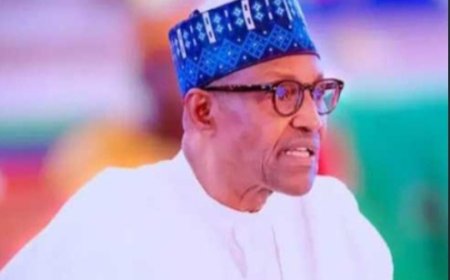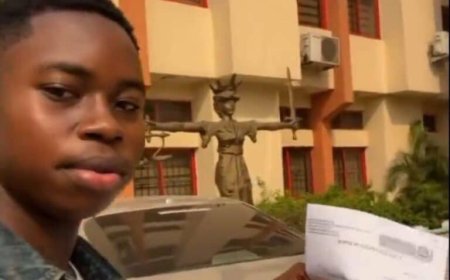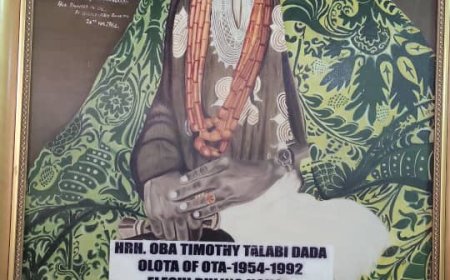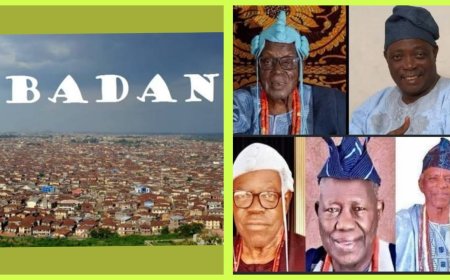Breaking Down the CPC Designation: How Government Appeasement of Terrorists Led to International Sanction
In this opinion article, an Investigative Journalist, Activist and Social Media Commentator in Kaduna State, Steven Kefas, based on his personal experience and professional engagements with the situation of things in Nigeria, has openly documented his opinion in this treatise on the Christian genocide issue that is attracting unprecedented international attention and actions.
By: Stephen Kefas
Yesterday, the United States designated Nigeria as a Country of Particular Concern (CPC) for severe violations of religious freedom, a long-overdue recognition of the systematic persecution of Christians and other vulnerable communities that has claimed tens of thousands of lives over the past two decades. This designation didn't emerge from vacuum; it reflects years of documented evidence, mounting international pressure, and most critically, the lack of political will by successive Nigerian governments to confront the Fulani jihadist insurgency decimating indigenous communities across the Middle Belt and beyond.
*Understanding the CPC Designation*
A Country of Particular Concern designation under the International Religious Freedom Act represents one of the most serious diplomatic rebukes the United States can issue. It signals that a government has either engaged in or tolerated systematic, ongoing, and egregious violations of religious freedom. For Nigeria, this designation specifically addresses the government's failure to prevent, investigate, or prosecute mass atrocities against Christian communities, particularly those carried out by armed Fulani militia groups operating with apparent impunity across multiple states.
The designation comes with potential consequences including sanctions, travel restrictions on government officials, and limitations on security assistance. More significantly, it places Nigeria alongside countries like China, Russia, Iran, and North Korea on a list of the world's worst violators of religious freedom, a devastating blow to Nigeria's international reputation and a clear message that the world is no longer willing to ignore the bloodshed.
*The Fulani Jihadist Insurgency: An Unacknowledged Genocide*
For over two decades, armed Fulani militia groups have waged a systematic campaign of violence against predominantly Christian farming communities across Nigeria's Middle Belt states including Plateau, Niger, Kwara, Kogi, Benue, Taraba, Adamawa, and Southern Kaduna. These attacks follow predictable patterns: midnight raids on sleeping villages, mass shootings, burning of homes and churches, destruction of farmland, kidnapping for ransom, and forced displacement of entire communities from their ancestral lands.
The Nigerian government and many media outlets have persistently characterized this violence as "farmer-herder clashes" driven by competition over land and water resources, a narrative that deliberately obscures the religious and ethnic dimensions of these attacks. This framing ignores overwhelming evidence that these are coordinated military-style operations targeting Christian communities specifically, not spontaneous conflicts between economic groups. Survivors consistently report attackers shouting "Allahu Akbar" during raids, specifically targetingChristian farming communities.
International organizations including Genocide Watch, the United States Commission on International Religious Freedom (USCIRF), and Open Doors have repeatedly warned that the violence against Christians in Nigeria's Middle Belt exhibits markers of genocide according to the UN Convention on Genocide. Yet the Nigerian government continues to downplay the religious dimensions, refuses to designate perpetrating groups as terrorists, and has failed to arrest or prosecute those responsible for these atrocities despite thousands of documented attacks.
*The Paradox of Invisible Terrorists*
During my own incarceration in Kaduna Custodial Center (prison), in the very heart of the region most affected by Fulani terrorist violence, I made a disturbing observation: despite thousands of documented attacks, mass killings, and the displacement of millions, I never encountered a single Fulani terrorist among the prison population. The prisons were filled with common criminals, political detainees, and individuals accused of various offenses, but conspicuously absent were members of the armed groups terrorizing communities just kilometers away from the prison walls.
This glaring absence raises fundamental questions about the Nigerian government's commitment to justice and accountability. If Fulani militias are genuinely criminal groups operating outside state control, why aren't security forces arresting them? If they're terrorists threatening national security, why aren't they being prosecuted? The most troubling explanation is that these groups operate with official protection or at minimum, deliberate tolerance from elements within Nigeria's security architecture.
Multiple credible reports document security forces arriving hours after attacks despite communities alerting authorities during ongoing raids, refusing to pursue fleeing attackers, and in some cases, actively preventing communities from defending themselves. Some survivors report security personnel withdrawing from areas just before attacks occur, suggesting foreknowledge if not coordination. This pattern of complicity extends to the judicial system, where rare arrests of suspected Fulani militants typically result in quiet releases without prosecution.
*The Nuhu Ribadu Problem: Peace Deals That Embolden Terrorists*
At the center of Nigeria's failed counterterrorism strategy sits National Security Adviser, Mallam Nuhu Ribadu, whose approach to the Fulani jihadist insurgency has been characterized by appeasement rather than confrontation. Ribadu has allegedly championed "peace deals" with armed Fulani groups in the North West that require no genuine disarmament, demand no accountability for past atrocities, and impose no meaningful conditions on participants.
Most disturbingly, these peace meetings have become theatrical displays where armed terrorists attend openly carrying weapons, not as surrendered arms but as symbols of their continued power. Rather than being disarmed and arrested, these individuals are feted, given platforms to air grievances, and often provided government resources ostensibly for "rehabilitation" that never materializes into genuine transformation. The message sent is clear: terrorism pays, and the Nigerian state will negotiate with you while you remain armed and dangerous.
This approach represents a fundamental misunderstanding of counterinsurgency principles. Genuine peace processes require that armed groups demonstrate commitment to peace through verifiable disarmament, cessation of violence, and accountability for past crimes. Ribadu's peace deals offer none of these, instead legitimizing terrorist groups as stakeholders in governance while their victims remain displaced, traumatized, and vulnerable to renewed attacks.
For communities that have lost thousands of family members, seen their villages burned repeatedly, and remain displaced years after initial attacks, these peace deals represent a betrayal. They watch their attackers attend government-sponsored meetings with full military regalia while they languish in IDP camps with no justice, no compensation, and no protection against future violence. This is not peace; it is surrender disguised as reconciliation.
*The Controversial Defense Appointment: Signaling Priorities*
The Tinubu administration's appointment of former Zamfara State Governor Bello Matawalle Minister of State for Defence sends a chilling message about the government's priorities regarding the Fulani jihadist insurgency. Matawalle's tenure as Zamfara governor was marked by controversial policies toward armed bandits and terrorists operating in the state, including peace deals that critics argue emboldened rather than deterred violence.
Under Matawalle's governorship, Zamfara became infamous for its approach of negotiating with terrorists while often taking harsh measures against communities advocating for self-defense. His administration faced accusations of sympathizing with armed groups while failing to protect vulnerable populations. Now elevated to a key defense position at the federal level, Matawalle's appointment suggests either profound tone-deafness about the optics of placing a terrorist sympathizer in charge of national defense, or a deliberate signal that the government's appeasement approach will continue.
This appointment is particularly offensive to Christian communities in the Middle Belt who have borne the brunt of Fulani terrorist violence. It communicates that their concerns about religious persecution are not taken seriously, that their calls for justice fall on deaf ears, and that those who accommodate terrorists are rewarded with higher office while their victims remain forgotten.
*The Broader Context: Why Accountability Matters*
The lack of accountability for religious persecution in Nigeria extends beyond the Fulani insurgency, though that remains the deadliest manifestation. It includes the Boko Haram and ISWAP insurgencies in the Northeast that have killed tens of thousands and displaced millions, primarily targeting Christians and moderate Muslims. It encompasses discriminatory Sharia law implementation in Northern states that criminalizes Christian evangelism while permitting Islamic proselytization. It involves systematic discrimination in government appointments, educational opportunities, and economic development that favors Muslims over Christians in Northern states.
This pattern of impunity has convinced perpetrators that targeting Christians carries no consequences. When terrorist commanders remain free after documented massacres, when government officials who facilitate violence face no sanctions, when security forces who fail to protect vulnerable communities receive no discipline, the message is clear: Christian lives don't matter in Nigeria's calculus of power.
The CPC designation represents the international community finally saying: we see what you're doing, we will no longer accept your excuses, and there will be consequences for continued inaction. This is not interference in Nigeria's internal affairs; it is a response to a government's failure to protect its own citizens and uphold its obligations under international human rights law.
*What Must Change: A Roadmap for Action*
For Nigeria to address the concerns underlying the CPC designation and genuinely protect religious freedom, several immediate actions are necessary:
First, National Security Adviser Nuhu Ribadu must be removed and replaced with a competent, no-nonsense security official committed to crushing jihadist insurgencies rather than accommodating them.
The current appeasement approach has demonstrably failed, emboldening terrorists while failing to provide security for vulnerable communities. Nigeria needs security leadership that understands counterterrorism, respects human rights, and prioritizes protection of all citizens regardless of religious identity.
Second, armed Fulani militia groups must be officially designated as terrorist organizations and prosecuted accordingly.
The fiction that these are mere "herders" involved in resource conflicts must end. These are organized armed groups conducting systematic attacks on civilian populations with religious and ethnic motivations. They must be treated as the terrorists they are, with full application of Nigeria's terrorism laws including arrests, prosecutions, and asset freezures.
Third, a comprehensive program of arrests and prosecutions of terrorist commanders must be implemented immediately.
Years of documented attacks have produced extensive evidence aboutsponsors, operational patterns, and specific perpetrators. This evidence must be acted upon with coordinated operations to arrest sponsors, dismantle networks, and bring perpetrators before courts. This requires political will from the highest levels of government to overcome resistance from those who benefit from the status quo.
Fourth, the appointment of controversial figures like Bello Matawalle to key security positions must be reversed.
These appointments signal that the government is not serious about confronting religious persecution. Replacing such officials with individuals who have demonstrated commitment to protecting all Nigerians regardless of religious identity is essential for restoring confidence in government intentions.
Fifth, a comprehensive program of justice and reparations for victims must be established.
Millions of displaced persons need pathways to return home safely, rebuild destroyed communities, and receive compensation for losses. Survivors of attacks need access to trauma counseling and medical care. Communities need assurance that their security will be prioritized and that future attacks will be prevented.
*The Trump Factor: Why This Time Is Different*
While I sympathize with President Tinubu's administration, which inherited these problems when taking office just two years ago, the reality is that the lack of political will to confront Fulani jihadists predates his presidency and continues under his watch. Previous U.S. administrations issued strongly worded statements about religious persecution in Nigeria but took limited concrete action. The Trump administration has demonstrated willingness to move beyond rhetoric to consequences, as evidenced by the CPC designation.
This represents a potential turning point. Under President Trump's leadership, the United States has signaled that the days of endless massacre of Christians without accountability are over. The CPC designation is likely just the beginning, with targeted sanctions, visa restrictions, and other measures potentially forthcoming if Nigeria fails to demonstrate genuine progress on protecting religious freedom.
For Nigerian officials who have operated with impunity while facilitating or tolerating religious persecution, this should serve as a wake-up call. The world is watching, documentation is being compiled, and accountability mechanisms are being activated. The comfortable assumption that international outrage will never translate into consequences is no longer valid.
*A Message to the Nigerian Government*
You have lied to the world about the nature of violence against Christians in Nigeria, characterizing genocide as "farmer-herder clashes" and systematic religious persecution as resource competition. You have protected perpetrators while abandoning victims. You have appointed terrorist sympathizers to defense positions while imprisoning those who dare to defend themselves. You have negotiated with armed terrorists while refusing justice to their victims.
The world is watching, and your lies are no longer accepted. The CPC designation is deserved, and more actions will follow if you continue on this path. It is time to act and act very fast. Crush the jihadists, protect the lives of Christians and other vulnerable communities, demonstrate through concrete actions rather than empty rhetoric that you are committed to religious freedom, and the USA will undesignate Nigeria with immediate alacrity.
The choice is yours: continue the current path of appeasement and complicity and face increasing international isolation and consequences, or demonstrate genuine political will to confront religious persecution and restore Nigeria's standing in the community of nations that respect human rights.
*Conclusion: Hope Amidst Darkness*
Despite the grim realities documented above, there is reason for cautious hope. The CPC designation represents international recognition that has eluded victims of religious persecution in Nigeria for decades. It validates their suffering, acknowledges their testimonies, and signals that they have not been forgotten by the wider world.
For those of us who have documented these atrocities, advocated for victims, and refused to accept official narratives that obscure the truth, this designation represents vindication. Our work has not been in vain. The evidence we have compiled, the testimonies we have preserved, and the advocacy we have undertaken has finally broken through the wall of denial and reached decision-makers willing to act.
The question now is whether the Nigerian government will respond with genuine reform or with defiance and denial. The path forward is clear: accountability, justice, protection, and genuine commitment to religious freedom for all Nigerians. Whether Nigeria's leadership has the wisdom and courage to take this path remains to be seen, but one thing is certain—the world is watching, and the days of impunity are numbered.
##
Steven Kefas is an investigative journalist, Senior Research Analyst at the Observatory for Religious Freedom in Africa, and Publisher of Middle Belt Times. He has documented religious persecution and forced displacement in Nigeria's Middle Belt for over a decade.
What's Your Reaction?










